Khursheed Kamal Aziz
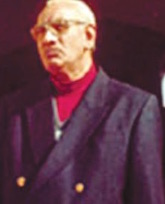 Son of Barrister Abdul Aziz, a well-known historian in his own right who added to his fame by initiating pioneering work on Heer Waris Shah, K.K. Aziz was born in the village of Ballamabad near Lyallpur (now Faisalabad) on December 11, 1927. He studied at the Government College, Lahore, where his teachers included Ahmed Shah Bukhari Patras and Prof Sirajuddin.
Son of Barrister Abdul Aziz, a well-known historian in his own right who added to his fame by initiating pioneering work on Heer Waris Shah, K.K. Aziz was born in the village of Ballamabad near Lyallpur (now Faisalabad) on December 11, 1927. He studied at the Government College, Lahore, where his teachers included Ahmed Shah Bukhari Patras and Prof Sirajuddin.
Aziz taught at various reputed institutions such as the universities of Cambridge, London, Heidelberg, Khartoum and the Punjab University in Pakistan. He also delivered occasional lectures at universities in Pakistan: Karachi, Peshawar, Islamabad; Bangladesh: Dacca; United Kingdom: Hull, New Castle upon Tyne and Oxford; Switzerland: Geneva and Bergen. His research enriched by the exposure abroad, he would return to his country to work on extremely difficult themes that brought out the best in him – and quite often the worst in self-employed minders of Pakistan’s ideology.
In 1978, he was working as the head of the National Commission of Historical and Cultural Research in Islamabad when he was forced to leave Pakistan by the Ziaul Haq regime that was anathema to independent scholarship. This was followed by teaching assignments in England, Germany and Sudan before he finally settled in Lahore some years ago, writing profusely and frequently undertaking foreign tours.
He worked as an advisor to Z. A. Bhutto and was the chairman of the National Commission on Historical and Cultural Research. His career came to an abrupt halt when Z. A. Bhutto was deposed and he was ultimately made to leave the country. He returned his “Sitara e Imtiaz” in protest of this treatment.
He died in Lahore at the age of 83 in 2009.
Literary works
Aziz had a profound love for words and writing. He authored 44 valuable books on the modern history the Muslims of subcontinent. He had a unique style of writing that stimulated readers thought. He wrote on significant issues related to Pakistan and also came up with volumes of significant details on important dignitaries who helped in shaping the history of subcontinent.
Bibliography
Some of his books include:
- History of the Ideas of Pakistan
- The Meaning of Islamic Art
- Public Life in Muslim India
- The Murder of History : A Critique of History Textbooks used in Pakistan (one of his famous works)[1]
- The Making of Pakistan: A Study in Nationalism.
- Studies in History and Politics
- Party Politics in Pakisan 1947–1958
- Britain and Pakistan
- Muslims Under Congress Rule 1937–1939
- British Imperialism in India
- Wo Hawadis Ashna
- The Partition of India and Emergence of Pakistan
- The Pakistani Historian
- History of Partition of India
- Rahmat Ali: A Biography
- British Imperialism in India
- The All India Muslim Conference 1928–1935: A Documentary Record.
- Religion, Land and Politics in Pakistan: A Study of Piri-Muridi.
- Public Life in Muslim India, 1850–1947 A Compendium of Basic Information on Political, Social, Religions, and Educational Organizations Active in Pre-Partition India.
- World Powers and the 1971 Breakup of Pakistan.
- The Coffee House of Lahore: A Memoir 1942–57.
(From Wikipedia)
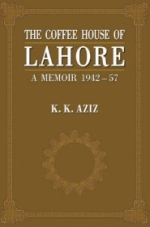 The Coffee House of Lahore: A Memoir
The Coffee House of Lahore: A Memoir
K. K. Aziz
Before his death in July 2009, KK Aziz had accomplished one mission that he had set for himself, i.e. to write about the Lahore Coffee House, the glorious nursery of ideas. Luckily, despite his failing health, Aziz finished a draft that was meant to be a shining part of his autobiographical kaleidoscope.
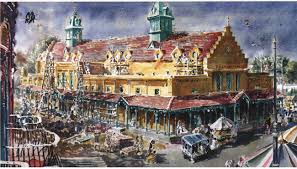 KK Aziz and the Coffee House of Lahore: Chris Moffat
KK Aziz and the Coffee House of Lahore: Chris Moffat
During a recent trip to Lahore, I visited the Sang-e-Meel bookshop on Lower Mall Road in search of K.K. Aziz’s The Coffee House of Lahore. Happily, the store was well stocked with the late historian’s final work, and I spent the afternoon reading the text at a table outside the nearby Tollinton Market.
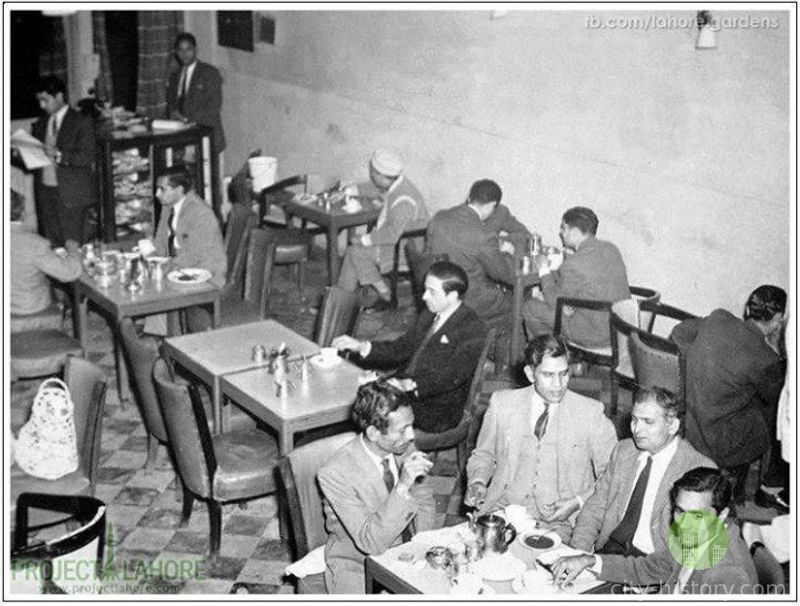 Book Excerpt: Coffee House of Lahore by KK Aziz
Book Excerpt: Coffee House of Lahore by KK Aziz
the 1920s onwards, perhaps since event earlier, Lahore was the most highly cultured city of north India. From here appeared the largest number of Urdu literary journals, newspapers and books and two of the best English language dailies. The Mayo School of Arts was flourishing. The Young Men Christian Association was active and its premises and hall were used by all communities for literary and social activities.
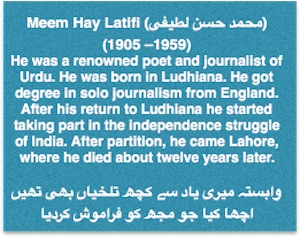 Muhammad Hasan Latifi: The Coffee House of Lahore by KK Aziz
Muhammad Hasan Latifi: The Coffee House of Lahore by KK Aziz
He was one of those remarkable men who arrived in Lahore in 1947 as a part of the flotsam & jetsam of the partition of the Punjab. His acute sufferings began with the ravages of the great migration & ended with his death 12 years later. The story of his life needs to be told in some detail.
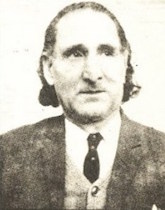 Zaheer Kashmiri: The Coffee House of Lahore by KK Aziz
Zaheer Kashmiri: The Coffee House of Lahore by KK Aziz
A flamboyant personality, consciously outrageous, bent upon having his say on the subject of his choice, and colourful in his deportment and dress. but all this served as an outer cover (perhaps a disguise) for a heart palpitating on the plight of the oppressed and a soul full of fellowship in sorrow… As an Urdu poet his reputation stands high.
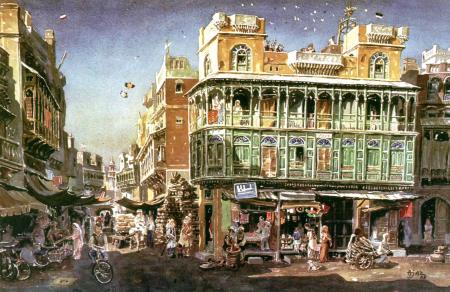 Arab Hotel Lahore: KK Aziz and A Hameed
Arab Hotel Lahore: KK Aziz and A Hameed
No description of the cultural life of Lahore can be complete without mentioning the Arab Hotel. Once the old-fashioned baithaks (sitting rooms of the orient) had gone out f use, the literati wanted a pace where they could meet, eat and talk. For those ‘orientalists’ of the 1920s the Mall was too Westernized, distant and costly. By chance they started patronizing a small, unclean restaurant on Railway Road, opposite the gate of the Islamia College.
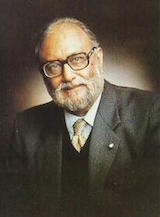 Dr. Abdus Salam: The Coffee House of Lahore By K K Aziz
Dr. Abdus Salam: The Coffee House of Lahore By K K Aziz
Among my contemporaries and colleagues in Government College, companions in the Coffee House of Lahore and friends at these places and Elsewhere there is only one genius, and that was Abdus Salam. Salam was the son of Chaudhri Muhammad Husain, a schoolteacher of Jhang and Hajirah who belonged to Faizullah Chak near Batala Muhammad Husain was ajat and Hajirah a Kakkezai.
